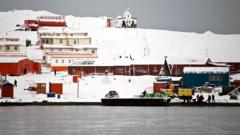The Pope lauds the treaty as a monumental step in rectifying past wrongs against the Chagossians, while some UK leaders express concern over national security implications.
Pope Celebrates UK-Mauritius Agreement on Chagos Islands as 'Victory for Justice'

Pope Celebrates UK-Mauritius Agreement on Chagos Islands as 'Victory for Justice'
Pope Leo XIV expresses joy over the UK’s treaty to transfer sovereignty of Chagos Islands to Mauritius, showcasing hope for Chagossians.
Pope Leo XIV has publicly welcomed the United Kingdom's agreement to transfer sovereignty over the Chagos Islands to Mauritius, describing it as a "significant victory" for the Chagossians in their long struggle against historical injustices. During a meeting with a delegation of 15 Chagos refugees in Vatican City, the Pope expressed his delight over the treaty signed in May, which allows Mauritius to reclaim the islands while permitting continued operation of a US-UK military base on Diego Garcia for an initial period of 99 years.
In a statement delivered in French, the Pope emphasized the importance of respecting people's identities and rights, especially the right to return to their homeland after forcibly being displaced. He expressed hope that Mauritian authorities would facilitate the return of Chagossians to their islands, which they were forced to leave decades ago. Critics from the UK, including opposition leaders and some displaced Chagossians, have voiced their concerns about the implications of this treaty.
Historically, the UK acquired the islands in 1968 for £3 million, following which Mauritius has contended that it was coerced into relinquishing the islands in exchange for independence from Britain. Subsequently, the islands were depopulated to make way for military infrastructure, with many Chagossians relocated to Mauritius, Seychelles, or England.
Under the new agreement, the UK plans to compensate Mauritius at an average of £101 million yearly over 99 years, while maintaining a 24-mile exclusion zone around Diego Garcia, restricting construction or access without British consent. Despite the deal being framed as a step for justice, some political factions in the UK, including members of the Conservative party, have criticized it as detrimental to national security, suggesting it leaves Britain vulnerable to influences from countries like China.
The treaty remains pending approval from both the UK and Mauritian parliaments before taking effect. Mauritian Attorney General Gavin Glover expressed optimism, celebrating the agreement as the resolution of a 60-year struggle. Nonetheless, two women born in Diego Garcia, seeking to return to their birthplace, attempted a last-minute legal challenge against the deal in May, though this was dismissed by the High Court.





















